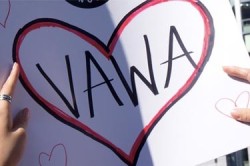
Then last year, in a crucial victory for the lesbian, gay, bisexual, and transgender (LGBT) community, Congress reauthorized a version of VAWA that included significant nondiscrimination protections for the LGBTQ community. VAWA now contains a nondiscrimination clause that prohibits LGBTQ victims from being turned away from services (like traditional shelters) on the basis of sexual orientation or gender identity. Further, it explicitly names LGBTQ people as an underserved population. By doing so, it allows organizations serving LGBTQ victims of domestic violence to receive funding from a grant program that focuses specifically on underserved populations. And it now allows states to use certain grant funds to improve responses to incidents of domestic violence among LGBTQ people. Although these grants are discretionary, this is a huge step for LGBTQ victims who will now be able to seek help and services without the fear of being turned away.
This incredibly important shift recognizes the elevated risks of LGBTQ people to intimate partner violence (IPV). Despite the fact that nearly half of IPV homicide victims are gay men, and transgender people, people of color, gay men and people under 30 remain most impacted by IPV, few LGBTQ IPV survivors access vital victim support services. Given the heightened vulnerability of LGBTQ people to this violence, the protections added in the 2013 reauthorization of VAWA will provide the critical tools needed to continue to make resources accessible to all survivors, regardless of sexual orientation or gender identity. Twenty years after its passage, VAWA continues to be strengthened so it can remain one of the most important pieces of legislation ever passed to protect survivors of violence.









